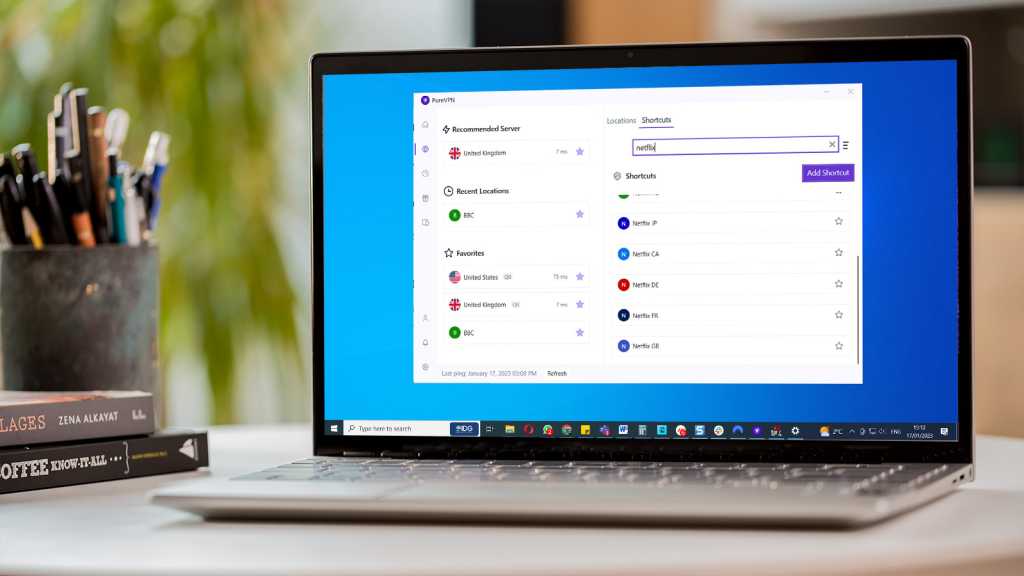Expert's Rating
Pros
- Unblocks various streaming services
- You can use 10 devices at the same time
- Inexpensive two-year plan
Cons
- Regular requests for verification while browsing the web
- Very few settings (and therefore features) in most apps
- Price more than doubles on renewal
Our Verdict
PureVPN’s big attraction is its low-priced multi-year subscriptions. It isn’t the best VPN service but it does unblock popular streaming services and could be a good choice if your needs are relatively simple.
PureVPN has seen some big changes over the last couple of years. Its apps had a complete makeover, it rolled out the WireGuard protocol to those apps and it moved its headquarters from Hong Kong to the British Virgin Islands.
If you’re not familiar with PureVPN, it’s one of the more well-established VPN services and has been around since 2007.
One of the big attractions – aside from the fact it can unblock quite a few popular streaming services – are the low-priced subscription deals which make it a cheaper option than Nord and other rivals. So, the big question is: should sign up?
Coverage
- 6,500 servers
- 96 locations
- 78 countries
Though numbers of servers are one way to compare VPN services, it’s not often a particularly useful metric. Most people will only ever need servers in a few key locations, such as one local to them for the fastest speeds, and a few in countries or regions where they want to unblock content – typically the US, Europe and Japan.
What’s more important is whether those servers are secure, whether they have fast connections and if they’re actually in the locations they claim to be.
PureVPN used to have a lot of virtual servers. There are pros and cons here, but what’s important is whether a VPN service clearly marks those servers as being virtual in its apps. PureVPN has decided to remove almost all virtual servers from its network and now has just 69, meaning 98.7% of those 6,500 servers are physically in the locations according to their names.
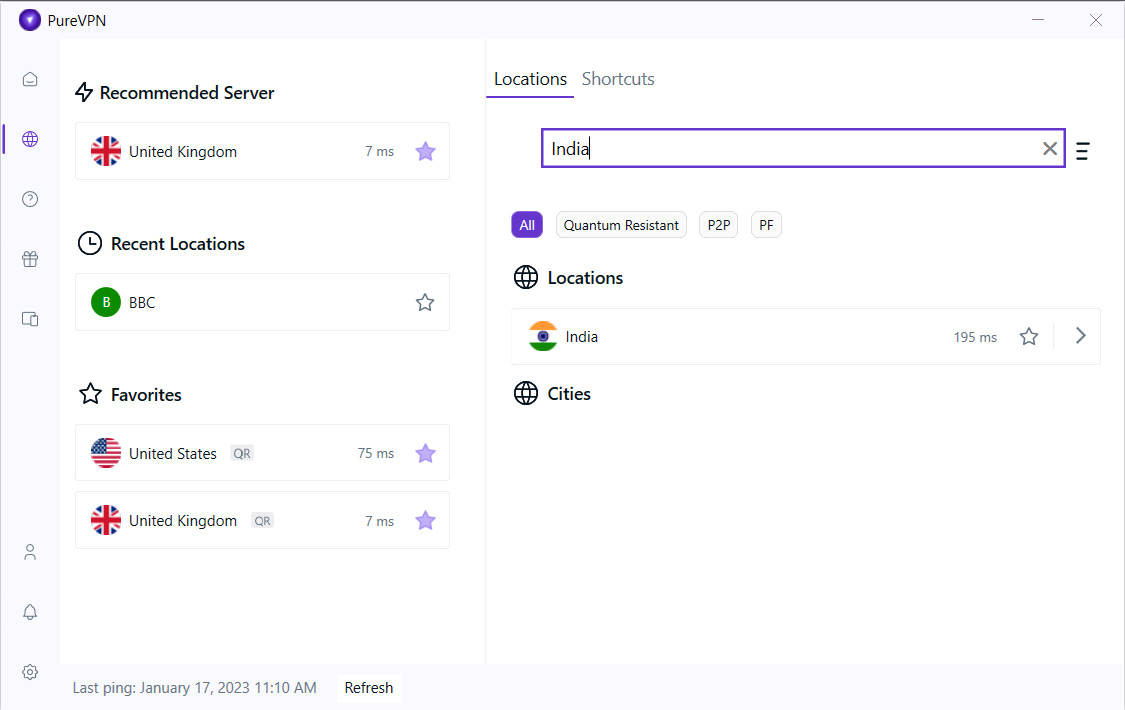
Jim Martin / Foundry
It’s a shame those aren’t marked up as such in PureVPN’s Windows app as they are on its website, though. These designations were removed when the Windows app got its overhaul, but you can see virtual servers in the Android and iOS apps.
You can filter the list by servers which support P2P downloading, port forwarding (if you buy that optional extra) and what PureVPN calls Quantum Resistant. Any server marked QR will generate encryption keys from a quantum computer.
The idea is that these strong keys are resistant to being cracked by a quantum computer – a device which is so powerful it could theoretically crack VPN encryption relatively quickly and leave your data exposed. However, we’ve no way of verifying PureVPN’s claims here.
If you want to access a specific streaming service, you can click on the Shortcuts tab and search for or browse through the list to find the one you want. These can be added alongside server locations in the Favourites list.
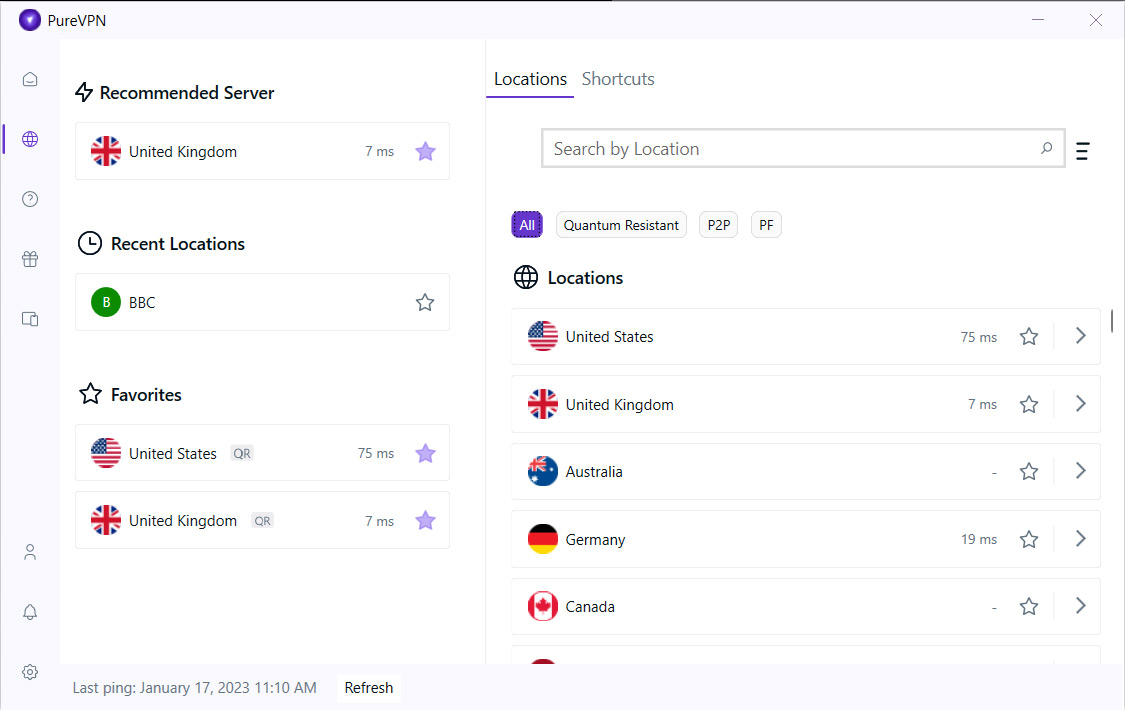
Jim Martin / Foundry
PureVPN has been going through the process of updating its servers from 10Gbps to 20Gbps ‘uplink’ connections. The plan is to make the upgrades in the most popular regions, but has only been completed in the UK so far. The faster uplink speed at the sever can lead to improved VPN speeds, but only when connected to those servers, of course.
PureVPN is also planning to adjust the speeds it offers to users based on their own broadband speeds. That should help in situations where someone has a very fast connection (such as 300Mbps or more) and won’t affect those with slower connections.
Apps & features
PureVPN offers apps for the four main operating systems: Windows, macOS, Android and iOS, as well as for Android TV and Amazon Firestick (which have both recently had a makeover).
The apps have a airy, uncluttered appearance and (with the exception of Windows) the option of dark and light themes. The updated Windows app initially lacked a couple of advanced features previously available, but split tunnelling has thankfully been re-added. It remains absent on the Mac version, however – very few VPNs have this feature on macOS with Private Internet Access and Hide.me being just about the only two we can think of which do.
When we last reviewed PureVPN at the start of 2022, it lacked WireGuard. But this protocol is now available in the four main apps.
They won’t necessarily use WireGuard by default, though. In the Windows app, for example, the default is to use the “Best VPN Protocol” and if you click on connection details, you can see which one it’s using. Every time we connected, it used IKEv2.
If you disable the automatic selection you’ll get a warning that connection times might increase and, when you pick WireGuard, you’ll see another that tells you that a few features may not be supported – but not what they are. We asked PureVPN to clarify this, and were told that dedicated IP and split-tunnelling aren’t available when you use WireGuard.
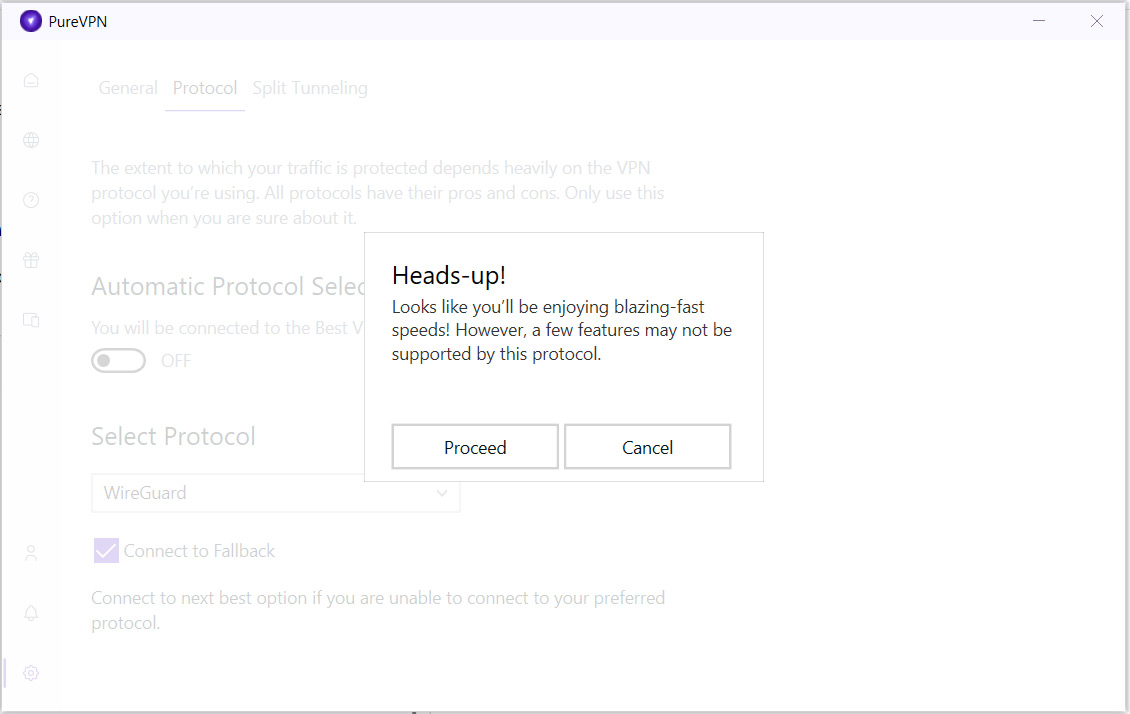
Jim Martin / Foundry
You’ll find features differ across the apps. For example, in the Windows app the kill switch is enabled by default but on macOS it is not, so you’ll have to enable it manually if you want to benefit from this extra security.
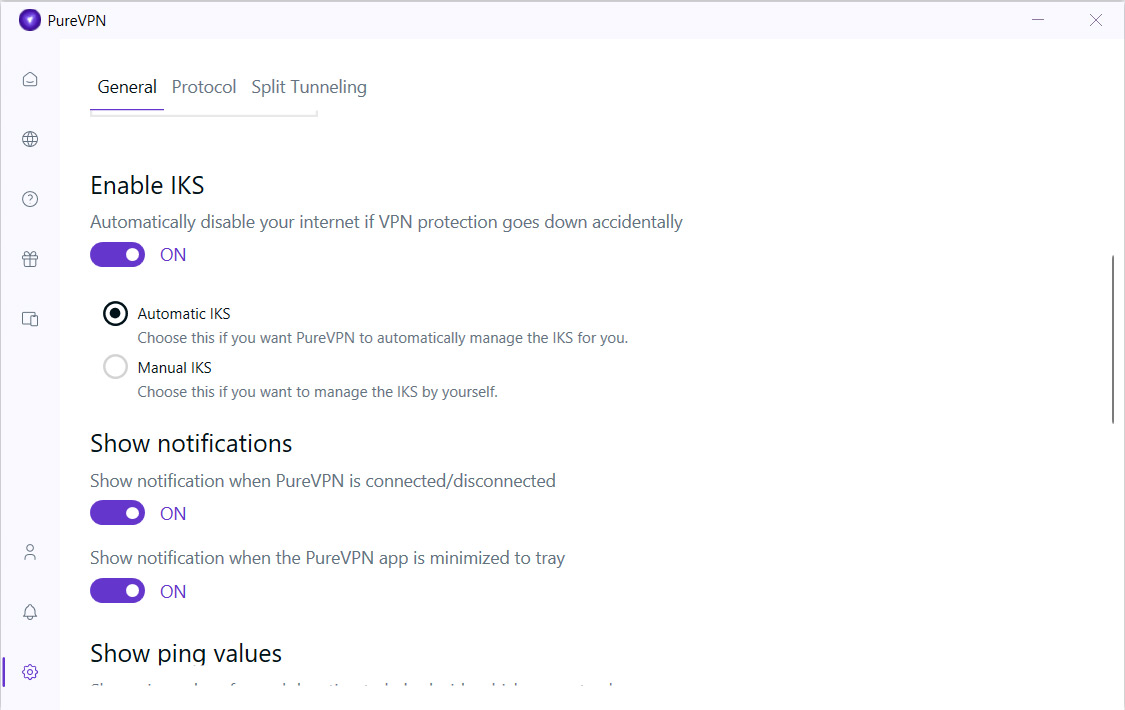
Jim Martin / Foundry
The Android app supports split tunelling, but there aren’t many other settings and options. For example, there’s no setting to connect to the VPN service automatically when your phone joins an untrusted Wi-Fi network, for example.
Similarly, the iOS app has very few settings and features. There’s no mention of a kill switch all and – when using version 9.10 of the app, the protocol was set to use the outdated IPSec, which was a surprise to see in the list at all. You can enable automatic selection or choose WireGuard, OpenVPN or IKEv2 manually.
Oddly, there are no pre-defined shortcuts on mobile as in the Windows app, but you can create them yourself by searching for a streaming service (you can’t see a list until you start typing) and then a country. This makes sense for Netflix where you might want the USA or Japan library, but it makes no sense to choose BBC and then be able to choose any country besides UK.
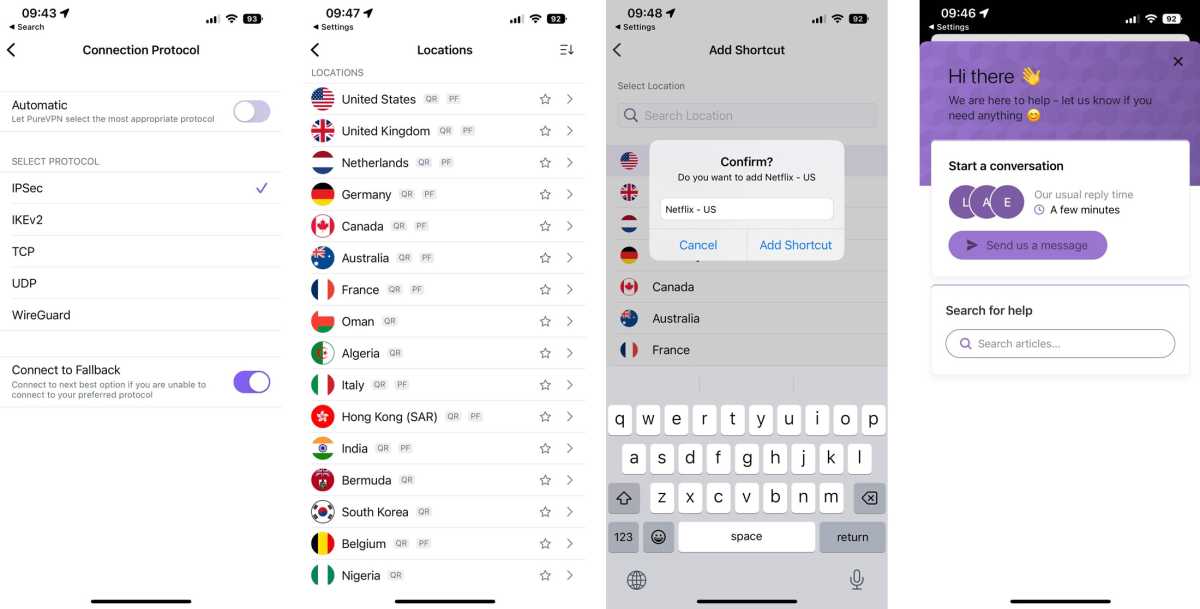
Jim Martin / Foundry
One good thing is that live chat is built into the mobile apps and generally, it doesn’t take very long at all to get answers to common questions.
Some of the advanced features (including port forwarding and dedicated IP addresses) are add-on options which add to the monthly cost. But most people won’t need them: they’re really designed for online gamers and those that need to access home servers remotely while the VPN is connected.
In its favour, PureVPN does have a wide selection of apps besides the core four. It’s available for Android TV, Amazon Fire TV, Linux and there’s even a Kodi add-on. Calling the Linux one an app is a bit misleading, though: it’s not. If you want to use it, it’s all command-line based.
Also, if you have a compatible router, you can download the DD-WRT applet and run literally every internet-connected device through PureVPN.
PureVPN also has extensions for Firefox and Chrome which are proxies, not VPNs. It used to call them Proxy Extension, but these days has – sadly – gone back to calling them “Best VPN for Chrome” and “Best VPN for Firefox” which is a bit misleading.
Although the company says they are encrypted proxies, they are not the same as the main VPN service and the data they say collect should put you off using it anyway. You might find a use for them for accessing websites and unblocking Netflix, but you should use the main VPN app for the best security and privacy.
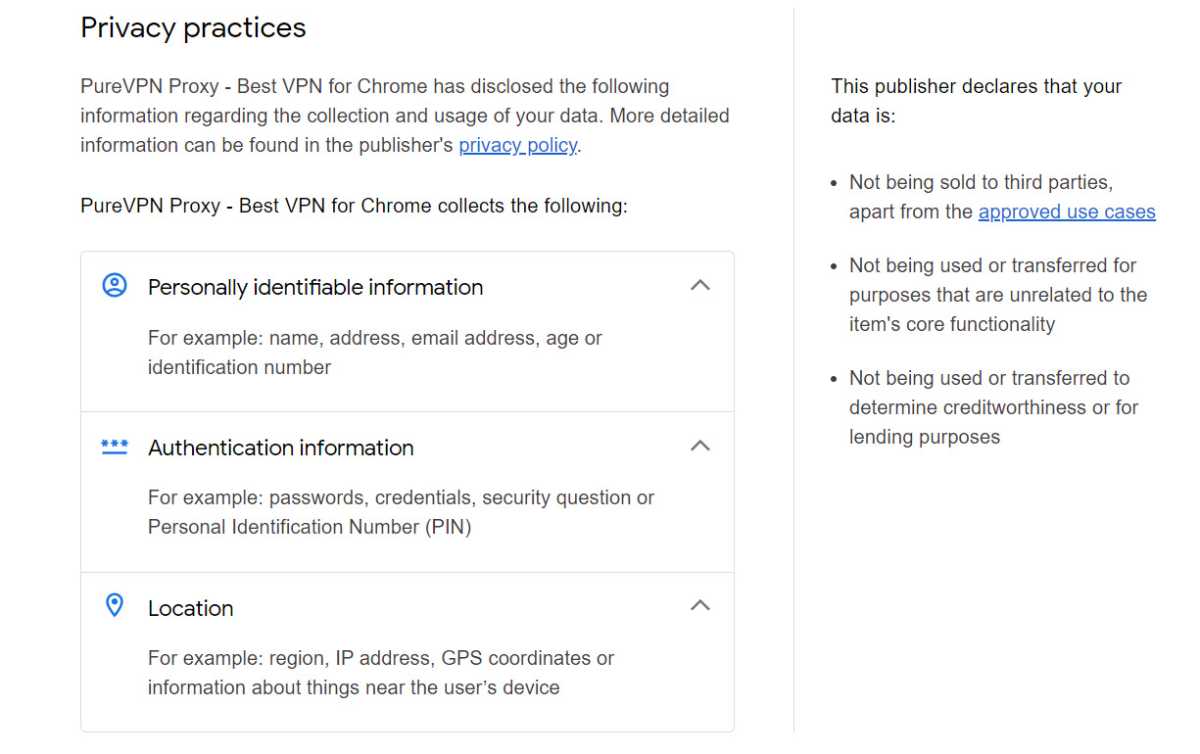
Jim Martin / Foundry
Performance
Whether you have a fast or slow broadband connection, you don’t want your VPN to slow it down.
Previously, we’ve said that PureVPN’s speeds weren’t wonderful but should improve when WireGuard is rolled out. This happened shortly after the last time we looked at the service in January 2022.
In January 2023 we ran a selection of tests using WireGuard in the Windows app from San Francisco using a gigabit broadband connection, both for upload and download speeds. At the specific time of testing, Speed Test reported a download speed of 826Mbps and an upload of 797Mbps.
When connected to these four PureVPN servers, in the UAE, New York, London and Tokyo, speeds dropped dramatically and were roughly on par with what we’d expect from OpenVPN.
The upload speed from the New York server was surprisingly poor at only 21Mbps. Another surprise was that the upload speed on the UAE server was surprisingly high at almost 300Mbps.
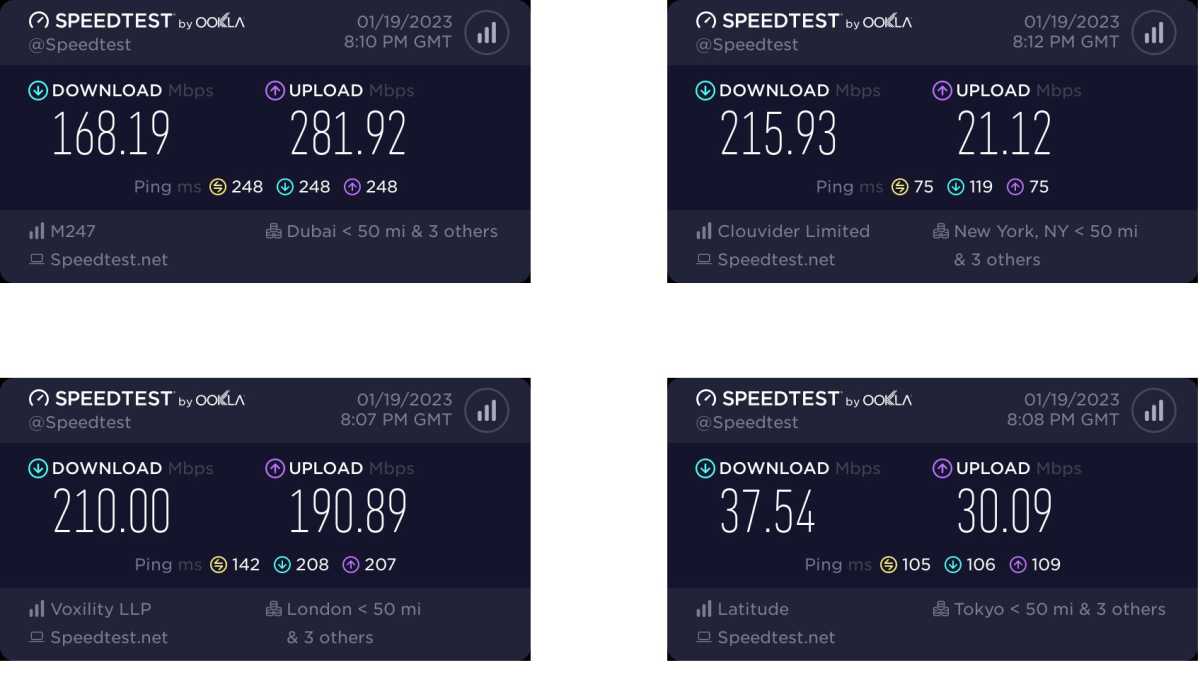
Jim Martin / Foundry
Further to these tests, we ran another from London connected to a general “USA” server and saw very little dropoff on an 80Mbps down / 20Mbps up connection.
Then, we tried connecting to the London server from Sydney in Australia on a 110Mbps (down) connection and recorded a speed of 79Mbps, which isn’t too bad considering the distance.
Ultimately, speeds of any VPN service will vary over time, and other factors also play their part including time of day.
In general we found connections were quickly established – taking well under 10 seconds. Connection times did increase when switching to WireGuard, sometimes taking over 20 seconds, but the connections were reliable once established. We saw no IP or DNS leaks at all when using the service, but it’s worth knowing that IPv6 connections are blocked because PureVPN doesn’t support them.
The other issue we ran into while using the service was that many websites detected “unusual traffic” and asked us to verify that we were a real human by clicking on photos containing certain objects. This quickly became annoying.
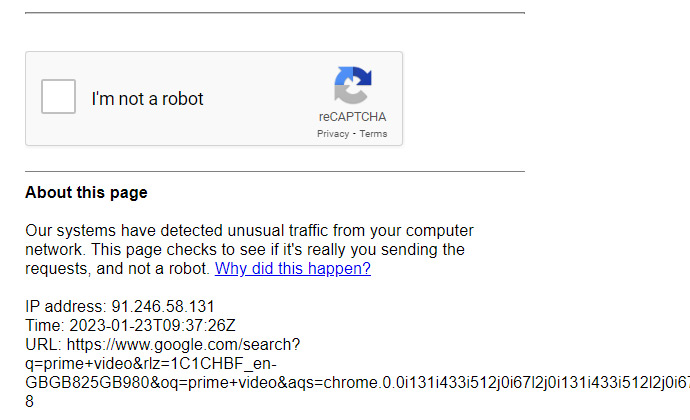
Jim Martin / Foundry
One recent update is obfuscation which hides the fact you’re using a VPN from websites and services, but this works only if you pick OpenVPN in the list of protocols. Except it isn’t labelled OpenVPN but rather TCP and UDP. Really, PureVPN shouldn’t require this sort of technical knowledge of its users, and this is certainly one area where its apps could be easier to use.
Unblocking
One of the highlights in our testing was that PureVPN allowed us to watch iPlayer from outside of the UK, but only when using the BBC shortcut. Use the London location, and we got the usual “BBC iPlayer is available only in the UK” error message.
Initially there were a few buffering problems, but this may have been down to stormy weather in Sydney: subsequent tests went well with no buffering. We were also able to watch shows from ITV X with no problems.
Frustratingly, though, PureVPN refused to unblock the UK-based My5 service, despite a dedicated shortcut for it.
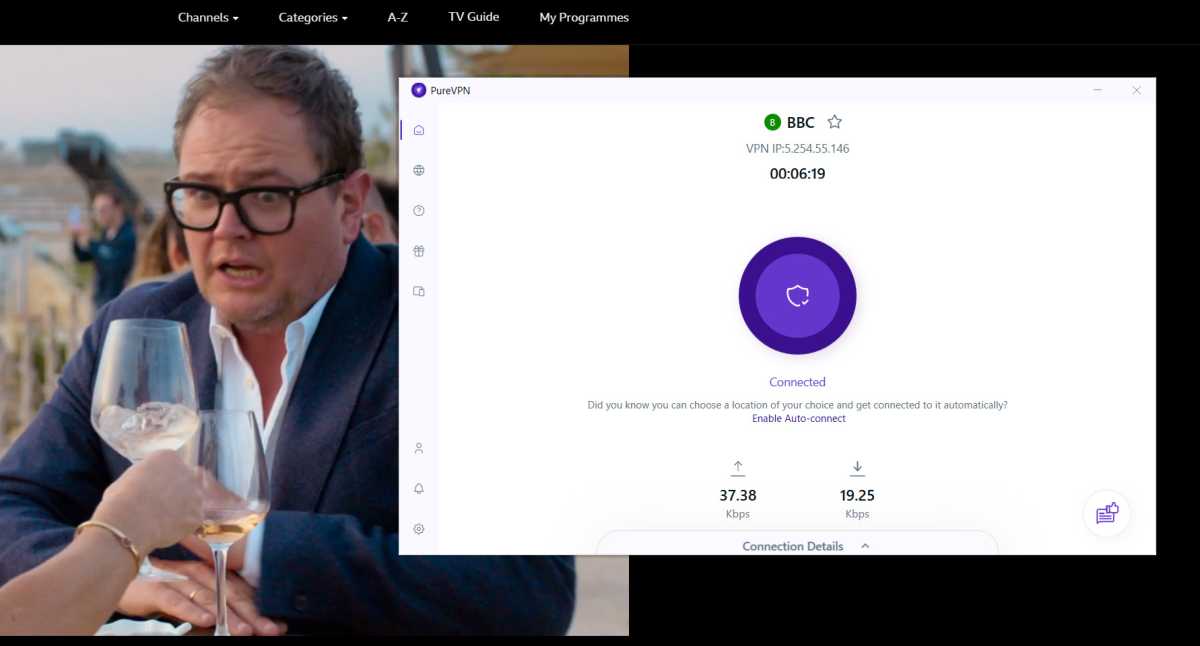
Jim Martin / Foundry
Watching US Netflix and Amazon Prime (when outside of the country your account is tied to) was simple and straightforward for the most part and, when watching Netflix from London, there was no buffering.
We were able to unblock Disney+ as well, using the Canada and Australia servers.
Do remember that unblocking streaming services is a cat-and-mouse game and that this is not a guarantee PureVPN will unblock the services you want on the day you want to watch.
Support
PureVPN offers 24/7 live chat support. There’s a link for this in the Windows app, which opens a web browser and, as mentioned, is now built into the mobile apps.
We’ve tested how quickly agents respond to questions a few times and – in general – it’s a fairly speedy and effective service. PureVPN has put a troubleshooting feature into its apps which help deal with common issues such as connecting to servers and switching between them.
There’s also a support section of the website where you can find a lot of information, too.
Where PureVPN appears to come unstuck is with more technical or billing issues. Although the company has a good TrustPilot rating, you don’t have to scroll for long until you find recent bad reviews which complain that technical problems aren’t resolved and cases are closed without a resolution. Similarly, there are lots of complaints that it is difficult or impossible to cancel your subscription and avoid the subscription renewing.
Price & plans
PureVPN charges $10.95 for a month’s access, but the service is much more affordable if you sign up for a year or two.
The best value subscription at the time of review was the two-year plan at $49.95.
That’s just $2.08 per month, and it’s great to see that PureVPN doesn’t falsely advertise a lower monthly price by factoring in the three free months it offers on top of those two years as most of its rivals do. So you get a total of 27 months.
For those in the UK, that’s around £1.50 per month.
At the end of the subscription, it will auto-renew and charge $53.95 annually, which is $4.50 per month: more than double the cost.
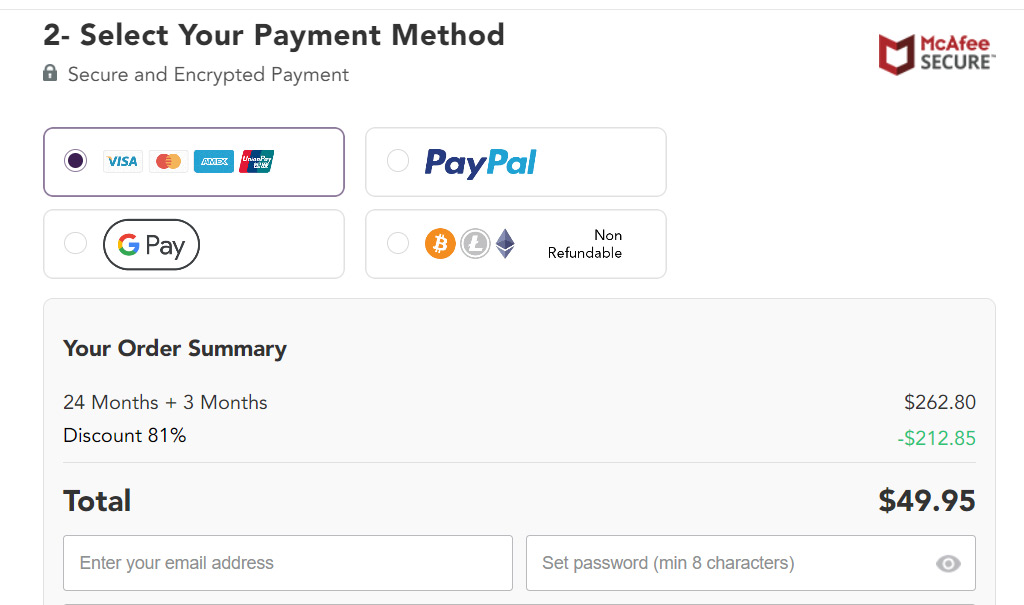
Jim Martin / Foundry
There are a variety of ways to pay for PureVPN including credit/debit card, PayPal, Google Pay and crypto if you want to remain anonymous, though there’s no refund if you choose this method. Otherwise, there’s a 31-day money-back guarantee. You can get a seven-day trial for $0.99, but watch out because this turns into a $6.95 per month charge afterwards: a much worse deal than PureVPN’s best offer.
Recently, the company extended its offering (as so many VPNs have) to include a password manager, encryption tool (for your files and photos) and a privacy tool for monitoring your personal info online, including on social media sites – and removing ads from Facebook.
The suite is called Pure² (or PureSquare) and those additional tools are optional extras when you sign up to PureVPN. We have not tested any of these.
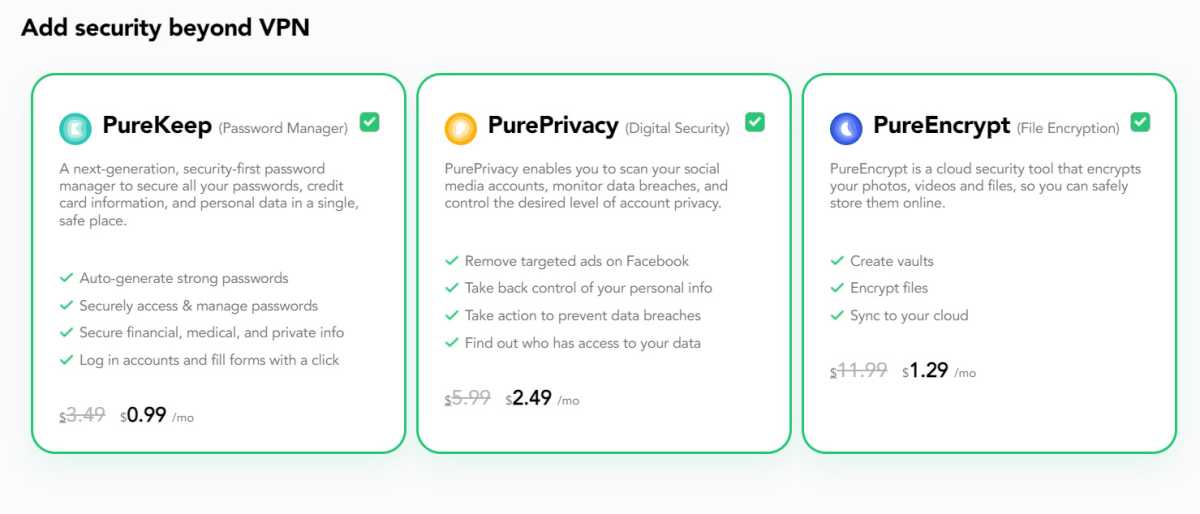
Jim Martin / Foundry
You’re allowed to have to 10 devices connected to the service at any time, which is more generous than a lot of VPN services.
Privacy
PureVPN doesn’t have a spotless report card when it comes to privacy. It’s almost infamous in the VPN world for handing over user data to the FBI in 2017, despite claiming to log no data.
Since then it has been audited – in 2021 – by KPMG, which confirmed that it did not store any user activity. That’s reassuring, as is the fact PureVPN is now registered in the British Virgin Islands and not Hong Kong.
Still, it wouldn’t be our top choice if privacy and security were the top items on our VPN wish-list.
Verdict
PureVPN is an affordable VPN service which offers speeds that are good enough for streaming, and it unblocks some – but not all – streaming services.
If that’s all you plan to use it for, and don’t really want to use it for privacy while browsing the web (which could get annoying if you’re constantly asked if you’re human), then you should be happy with the service.
Other services, such as NordVPN, reviewed, cost a bit more, but offer significantly faster speeds, an even more recent audit, and extra features such as double VPN for better privacy.

